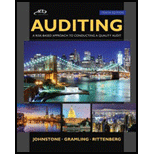
Auditing: A Risk Based-Approach to Conducting a Quality Audit
10th Edition
ISBN: 9781305080577
Author: Karla M Johnstone, Audrey A. Gramling, Larry E. Rittenberg
Publisher: South-Western College Pub
expand_more
expand_more
format_list_bulleted
Question
Chapter 7, Problem 11TFQ
To determine
Introduction: It is about relation between the high level of detection risk and the material misstatement
To clarify: To check and confirm whether the high level of detection risk is related with the audit firm’s willingness to accept a low risk for not detection of a material misstatement is true or false.
Expert Solution & Answer
Want to see the full answer?
Check out a sample textbook solution
Students have asked these similar questions
Kindly give a step by step details explaination of each answers especially question 5 and 6. Please, don't just give answers without explaining how we arrived at the answer. Thanks!
The following are the questions:
1. What is the general journal entries the transactions described for Hogan Company. All sales are on account. Use the date of December 31 to make the entry to summarize sales for the year in the old territory and new territory.
2. Make the journal entries to record the write-off of accounts in the new territory.
3. Make the journal entry to record the write-off of accounts in the old territory.
4. Make the entry on December 31 to record uncollectible accounts expense for 20X1 for both territories. Make the calculation using the percentages developed by Hogan.
5. Let’s say the Allowance for Doubtful Accounts had a credit balance of $24,800 on September 30 before any of the above entries were made. Calculate the balance in the allowance account after…
Financial accounting
General Accounting
Chapter 7 Solutions
Auditing: A Risk Based-Approach to Conducting a Quality Audit
Ch. 7 - Prob. 1TFQCh. 7 - Prob. 2TFQCh. 7 - Prob. 3TFQCh. 7 - Prob. 4TFQCh. 7 - Prob. 5TFQCh. 7 - Prob. 6TFQCh. 7 - Prob. 7TFQCh. 7 - Prob. 8TFQCh. 7 - Prob. 9TFQCh. 7 - Prob. 10TFQ
Ch. 7 - Prob. 11TFQCh. 7 - Prob. 12TFQCh. 7 - Prob. 13TFQCh. 7 - In terms of the timing of the risk response, the...Ch. 7 - Prob. 15MCQCh. 7 - Prob. 16MCQCh. 7 - Prob. 17MCQCh. 7 - Prob. 18MCQCh. 7 - Prob. 19MCQCh. 7 - Prob. 20MCQCh. 7 - Prob. 21MCQCh. 7 - Prob. 22MCQCh. 7 - Prob. 23MCQCh. 7 - Prob. 24MCQCh. 7 - Prob. 25MCQCh. 7 - Prob. 26MCQCh. 7 - Prob. 27MCQCh. 7 - Prob. 28MCQCh. 7 - Prob. 29RSCQCh. 7 - Prob. 30RSCQCh. 7 - Define the following terms: (a) performance...Ch. 7 - Prob. 32RSCQCh. 7 - Prob. 34RSCQCh. 7 - Prob. 35RSCQCh. 7 - Prob. 36RSCQCh. 7 - How does inherent risk relate to internal...Ch. 7 - Prob. 38RSCQCh. 7 - Prob. 39RSCQCh. 7 - Prob. 40RSCQCh. 7 - Prob. 43RSCQCh. 7 - Prob. 45RSCQCh. 7 - Prob. 46RSCQCh. 7 - Prob. 47RSCQCh. 7 - Prob. 48RSCQCh. 7 - Prob. 49RSCQCh. 7 - Prob. 52RSCQCh. 7 - Prob. 53RSCQCh. 7 - Prob. 54RSCQCh. 7 - Prob. 55RSCQCh. 7 - Prob. 56RSCQCh. 7 - Prob. 57RSCQCh. 7 - Prob. 58FF
Knowledge Booster
Similar questions
- Financial accounting questionsarrow_forwardThe standard composition of workers and their wage rates for producing certain product during a given month are as follows:• 12 skilled workers @ OMR 8 per hour each• 8 semi-skilled workers @ OMR 6 per hour each• 10 unskilled workers @ OMR 4 per hour eachDuring the month, the actual composition of workers was:• 10 skilled workers @ OMR 9 per hour each• 6 semi-skilled workers @ OMR 5 per hour each• 8 unskilled workers @ OMR 3 per hour eachThe standard output of the group was expected to be 5 units per hour. However, the workers were unable to produce any output for 8 hours due to a power failure. The group of workers was engaged for 120 hours during the month, and 580 units of output were recorded calculate LCV, LRV, LEV, LIIV, LYV and LMVarrow_forwardAnswer? ? General Accountingarrow_forward
arrow_back_ios
SEE MORE QUESTIONS
arrow_forward_ios
Recommended textbooks for you
 Auditing: A Risk Based-Approach (MindTap Course L...AccountingISBN:9781337619455Author:Karla M Johnstone, Audrey A. Gramling, Larry E. RittenbergPublisher:Cengage Learning
Auditing: A Risk Based-Approach (MindTap Course L...AccountingISBN:9781337619455Author:Karla M Johnstone, Audrey A. Gramling, Larry E. RittenbergPublisher:Cengage Learning Auditing: A Risk Based-Approach to Conducting a Q...AccountingISBN:9781305080577Author:Karla M Johnstone, Audrey A. Gramling, Larry E. RittenbergPublisher:South-Western College PubBusiness/Professional Ethics Directors/Executives...AccountingISBN:9781337485913Author:BROOKSPublisher:Cengage
Auditing: A Risk Based-Approach to Conducting a Q...AccountingISBN:9781305080577Author:Karla M Johnstone, Audrey A. Gramling, Larry E. RittenbergPublisher:South-Western College PubBusiness/Professional Ethics Directors/Executives...AccountingISBN:9781337485913Author:BROOKSPublisher:Cengage

Auditing: A Risk Based-Approach (MindTap Course L...
Accounting
ISBN:9781337619455
Author:Karla M Johnstone, Audrey A. Gramling, Larry E. Rittenberg
Publisher:Cengage Learning

Auditing: A Risk Based-Approach to Conducting a Q...
Accounting
ISBN:9781305080577
Author:Karla M Johnstone, Audrey A. Gramling, Larry E. Rittenberg
Publisher:South-Western College Pub

Business/Professional Ethics Directors/Executives...
Accounting
ISBN:9781337485913
Author:BROOKS
Publisher:Cengage